Alright guys, so this is gonna be really long post but worth reading if you want to know everything about blockchain technology, bitocin, dapps etc.
We will start with bitcoin, explaining blockchain tech and then where you can buy it, sell it, use it and all the necessary components attached.
What is Bitcoin?
Ok, so bitcoin is a form of digital currency, created and held electronically. No one controls it. Bitcoins aren’t printed, like dollars or euros – they’re produced by people, and increasingly businesses, running computers all around the world, using software that solves mathematical problems.
It’s the first example of a growing category of money known as cryptocurrency.

This is bitcoin's symbol
What makes it different from normal currencies?
Bitcoin can be utilized to purchase things electronically. In that sense, it resembles regular dollars, euros, or yen, which are additionally exchanged carefully.
Nonetheless, bitcoin's most essential trademark, and the thing that makes it distinctive to regular cash, is that it is decentralized. No single organization controls the bitcoin arrange. This comforts a few people, since it implies that a huge bank can't control their cash.
Who created it?
A software developer called Satoshi Nakamoto proposed bitcoin, which was an electronic payment system based on mathematical proof. The idea was to produce a currency independent of any central authority, transferable electronically, more or less instantly, with very low transaction fees.
Who prints it?
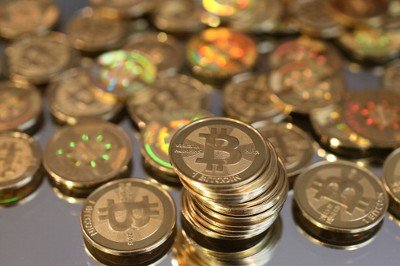
No one. This currency isn’t physically printed in the shadows by a central bank, unaccountable to the population, and making its own rules. Those banks can simply produce more money to cover the national debt, thus devaluing their currency.
Instead, bitcoin is created digitally, by a community of people that anyone can join. Bitcoins are ‘mined’, using computing power in a distributed network.
This network also processes transactions made with the virtual currency, effectively making bitcoin its own payment network.
So you can’t churn out unlimited bitcoins?
That’s right. The bitcoin protocol – the rules that make bitcoin work – say that only 21 million bitcoins can ever be created by miners. However, these coins can be divided into smaller parts (the smallest divisible amount is one hundred millionth of a bitcoin and is called a ‘Satoshi’, after the founder of bitcoin).
What is bitcoin based on?
Conventional currency has been based on gold or silver. Theoretically, you knew that if you handed over a dollar at the bank, you could get some gold back (although this didn’t actually work in practice). But bitcoin isn’t based on gold; it’s based on mathematics.
Around the world, people are using software programs that follow a mathematical formula to produce bitcoins. The mathematical formula is freely available, so that anyone can check it.
The software is also open source, meaning that anyone can look at it to make sure that it does what it is supposed to.
What are its characteristics?
Bitcoin has several important features that set it apart from government-backed currencies.
1. It's decentralized
The bitcoin network isn’t controlled by one central authority. Every machine that mines bitcoin and processes transactions makes up a part of the network, and the machines work together. That means that, in theory, one central authority can’t tinker with monetary policy and cause a meltdown – or simply decide to take people’s bitcoins away from them, as the Central European Bank decided to do in Cyprus in early 2013. And if some part of the network goes offline for some reason, the money keeps on flowing.
2. It's easy to set up
Conventional banks make you jump through hoops simply to open a bank account. Setting up merchant accounts for payment is another Kafkaesque task, beset by bureaucracy. However, you can set up a bitcoin address in seconds, no questions asked, and with no fees payable.
3. It's anonymous
Well, kind of. Users can hold multiple bitcoin addresses, and they aren’t linked to names, addresses, or other personally identifying information. However…
4. It's completely transparent
bitcoin stores details of every single transaction that ever happened in the network in a huge version of a general ledger, called the blockchain. The blockchain tells all.
If you have a publicly used bitcoin address, anyone can tell how many bitcoins are stored at that address. They just don’t know that it’s yours.
There are measures that people can take to make their activities more opaque on the bitcoin network, though, such as not using the same bitcoin addresses consistently, and not transferring lots of bitcoin to a single address.
5. Transaction fees are miniscule
Your bank may charge you a £10 fee for international transfers. Bitcoin doesn’t.
6. It’s fast
You can send money anywhere and it will arrive minutes later, as soon as the bitcoin network processes the payment.
7. It’s non-repudiable
When your bitcoins are sent, there’s no getting them back, unless the recipient returns them to you. They’re gone forever.
So, bitcoin has a lot going for it, in theory. But how does it work, in practice? Read more to find out how bitcoins are mined, what happens when a bitcoin transaction occurs, and how the network keeps track of everything.
Why Use BitCoin?
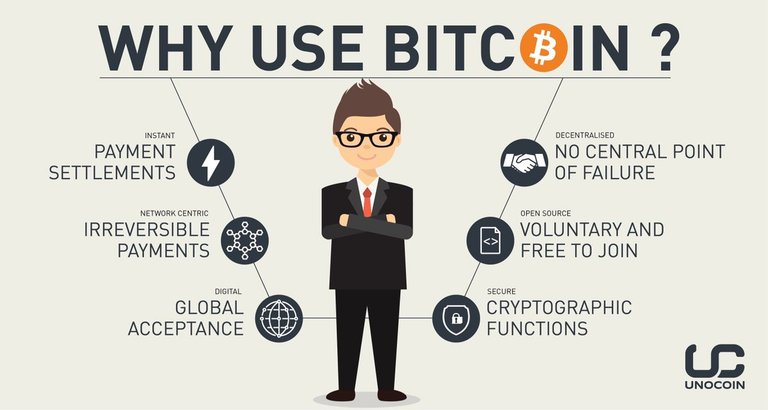
Bitcoin is a relatively new form of currency that is just beginning to hit the mainstream, but many people still don't understand why they should make the effort to use it.
Why use bitcoin? Here are 10 good reasons why it’s worth taking the time to get involved in this virtual currency.
It’s fast
When you pay a cheque from another bank into your bank, the bank will often hold that money for several days, because it can’t trust that the funds are really available. Similarly, international wire transfers can take a relatively long time. Bitcoin transactions, however, are generally far faster.
Transactions can be instantaneous if they are “zero-confirmation” transactions, meaning that the merchant takes on the risk of accepting a transaction that hasn’t yet been confirmed by the bitcoin blockchain. Or, they can take around 10 minutes if a merchant requires the transaction to be confirmed. That is far faster than any inter-bank transfer.
It’s cheap
What’s that you say? Your credit card transactions are instantaneous too? Well, that’s true. But your merchant (and possibly you) pay for that privilege. Some merchants will charge a fee for debit card transactions too, as they have to pay a ‘swipe fee’ for fulfilling them. Bitcoin transaction fees are minimal, or in some cases free.
Central governments can’t take it away
Remember what happened in Cyprus in March 2013? The Central Bank wanted to take back uninsured deposits larger than $100,000 to help recapitalize itself, causing huge unrest in the local population. It originally wanted to take a percentage of deposits below that figure, eating directly into family savings. That can’t happen with bitcoin. Because the currency is decentralized, you own it. No central authority has control, and so a bank can’t take it away from you. For those who find their trust in the traditional banking system unravelling, that’s a big benefit.
People can’t steal your payment information from merchants
This is a big one.
Bitcoin transactions, don’t require you to give up any secret information. Instead, they use two keys: a public key, and a private one. Anyone can see the public key (which is actually your bitcoin address), but your private key is secret. When you send a bitcoin, you ‘sign’ the transaction by combining your public and private keys together, and applying a mathematical function to them. This creates a certificate that proves the transaction came from you. As long as you don’t do anything silly like publishing your private key for everyone to see, you’re safe.
It isn’t inflationary
If you suddenly double the number of dollars in circulation, then that means there are two dollars where before there was only one. Someone who had been selling a chocolate bar for a dollar will have to double the price to make it worth the same as it was before, because a dollar suddenly has only half its value. This is called inflation, and it causes the price of goods and services to increase. Inflation can be difficult to control, and can decrease people’s buying power. Bitcoin was designed to have a maximum number of coins. Only 21 million will ever be created under the original specification. This means that after that, the number of bitcoins won’t grow, so inflation won’t be a problem. In fact, deflation – where the price of goods and services falls – is more likely in the bitcoin world.
It’s as private as you want it to be
Sometimes, we don’t want people knowing what we have purchased. Bitcoin is a relatively private currency. On the one hand, it is transparent – thanks to the blockchain, everyone knows how much a particular bitcoin address holds in transactions. They know where those transactions came from, and where they’re sent. On the other hand, unlike conventional bank accounts, no one knows who holds a particular bitcoin address. It’s like having a clear plastic wallet with no visible owner. Everyone can look inside it, but no one knows whose it is. However, it’s worth pointing out that people who use bitcoin unwisely (such as always using the same bitcoin address, or combining coins from multiple addresses into a single address) risk making it easier to identify them online.
You don’t need to trust anyone else
In a conventional banking system, you have to trust people to handle your money properly along the way. You have to trust the bank, for example. You might have to trust a third-party payment processor. You’ll often have to trust the merchant too. These organizations demand important, sensitive pieces of information from you. Because bitcoin is entirely decentralized, you need trust no one when using it. When you send a transaction, it is digitally signed, and secure. An unknown miner will verify it, and then the transaction is completed. The merchant need not even know who you are, unless you’ve arranged to tell them.
You own it
There is no bank in between, you own the currency.
You can create your own money
In spite of the amazing advances in home office colour printing technology, most national governments take a fairly dim view of you producing your own money. With bitcoin, however, it is encouraged. You can certainly buy bitcoins on the open market, but you can also mine your own if you have enough computing power. After covering your initial investment in equipment and electricity, mining bitcoins is simply a case of leaving the machine switched on, and the software running. And who wouldn't like their computer to earn them money while they sleep?
OK, so you've learned the basics about bitcoin, the next step is to get some bitcoins. But how? This guide will tell you what you need to know.
You can buy bitcoins from either exchanges, or directly from other people via marketplaces.
You can pay for them in a variety of ways, ranging from hard cash to credit and debit cards to wire transfers, or even with other cryptocurrencies, depending on who you are buying them from and where you live.
How can I buy bitcoins?
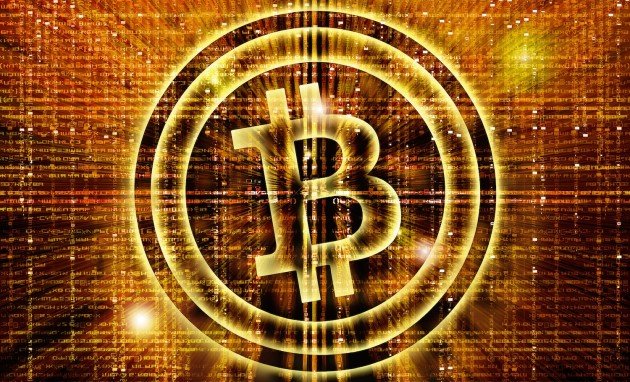
Surprisingly, it's still not easy to buy bitcoins with your credit card or PayPal, depending on your jurisdiction.
This is because such transactions can easily be reversed with a phone call to the card company (ie 'chargebacks'). Since it's hard to prove any goods changed hands in a transfer of bitcoins, exchanges avoid this payment method and so do most private sellers.
However, the options have recently grown for consumers in some countries.
In the US, Coinbase, and Circle offer purchases with credit cards. Bittylicious, CoinCorner and Coinbase offer this service in the UK, accepting 3D Secure-enabled credit and debit cards on the Visa and MasterCard networks.
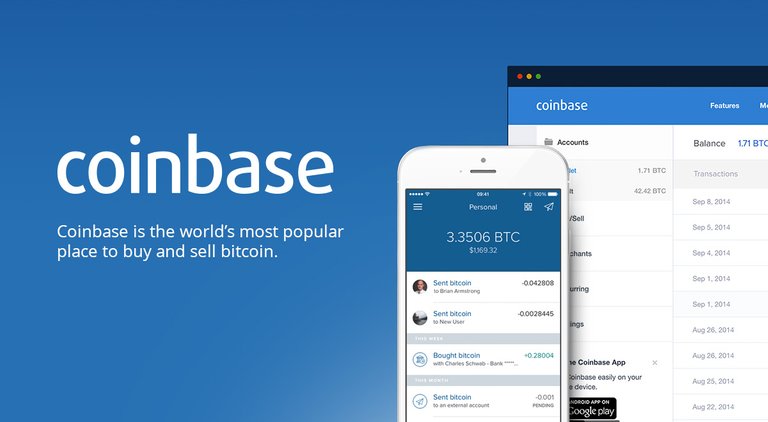
Underbanked consumers in the US can turn to expresscoin, which recently launched to serve this market, accepting money orders, personal checks and wire transfers.
First, get yourself a bitcoin wallet
Next, you will need a place to store your new bitcoins. In the bitcoin world, they're called a 'wallet' but it might be best to think of them as a kind of bank account.
Depending on the security levels you want, different wallets will provide different levels of security. Some act like everyday spending accounts and are comparable to a traditional leather wallet, while others tout military-grade protections.
The main options are: (1) a software wallet stored on the hard drive of your computer, (2) an online, web-based service or (3) a 'vault' service that keeps your bitcoins protected offline or multisig wallet that uses a number of keys to protect the account.
Most have their vulnerabilities: if you store bitcoins locally on your computer, make sure you back up your wallet regularly in case the drive becomes corrupted; and online web wallets employ varying degrees of security against hackers, from quite good (multi-factor authentication) to quite poor (ID and password).
For more on storing bitcoins, see our guide on the subject.
Exchanges and Online Wallets
Bitcoin newcomers will find a variety of exchanges and wallets competing for their business.
Some are full-blown exchanges for institutional traders, while others are simpler wallet services with a more limited buying and selling capabilities.
Most exchanges and wallets will store amounts of digital and/or fiat currency for you, much like a regular bank account.
Exchanges and wallets are the best option if you want to engage in regular trading and speculation, don't need total anonymity and don't mind lengthy bureaucratic setup procedures that usually involve proof of identity and supplying detailed contact information.
This is the law in most countries and no regulated exchange can get around it, as any company interfacing with the current financial system must meet 'know your customer' (KYC) and anti-money laundering (AML) requirements.
The best exchange option also depends where you're located.
For more information, you can check out this list of major bitcoin exchanges/wallets around the world, and the payment options they allow.
There are so many exchanges today like Kraken, Bittrex, cex.io, Quadriga, Poloneix etc to trade bitcoins with other currencies.
Warnings about exchanges, wallets and banks
Despite the proof of identity requirements, remember exchanges and wallets don't provide the same protections banks do.
For example, there is often no or limited insurance for your account if the exchange goes out of business or is robbed by hackers, such as was the case with the infamous failed exchange Mt Gox.
Bitcoin does not have legal status as a currency in most of the world, and authorities usually do not know how best to approach thefts. Some larger exchanges have replaced customer funds after a theft from the exchange itself, but at this stage they are not legally obliged to do so.
Further, if a theft from your personal wallet occurs due to a security or password lapse on your part, you do not have any guaranteed way to recover your funds.
Some existing banks see digital currency refuse to work with funds that were the result of digital currency transactions, citing regulatory uncertainty.
Check the list below first to see if your bank may have taken action against users in the past, and for your protection, open an account with a bank known to be more bitcoin-friendly.
Face-to-face, or 'over-the-counter' (OTC) trades
If you live in a city, prefer anonymity or don't want bank hassles, the easiest option to acquire bitcoin is to make a face-to-face trade with a local seller.
LocalBitcoins is the primary site where such transactions are arranged and prices negotiated. The site also provides an escrow service as an added layer of protection for both parties.
There are security considerations for both buyers and sellers, especially if the trade is a sizeable one. Always meet in a busy public place, don't meet in private homes and take all the precautions you'd usually taken when walking around with large amounts of cash.
Remember, if you're meeting face-to-face somewhere, you'll need to have access to your bitcoin wallet. Whether it's a smartphone, tablet or laptop, you'll also need live Internet access to confirm the transaction.
If one-on-one trades aren't your thing, check out Meetup.com to see if your area has a bitcoin meetup group, where you can do it all in a group setting and learn a lot from the other members in the process.
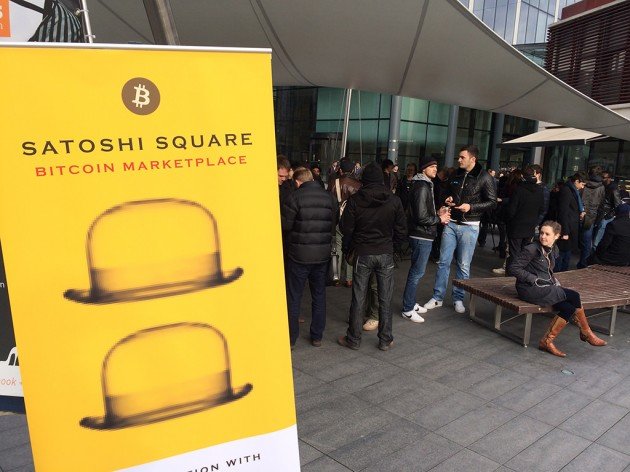
Depending on the seller, you may pay a premium of around 5-10% over the exchange price for a face-to-face trade, for convenience and privacy. A reputable trader will negotiate the price before a meeting, but many won't want to wait too long in case bitcoin's value takes a dramatic shift.
Some sellers may let you use a PayPal account to pay, though most prefer non-reversible cash for the reasons described earlier.
It's also wise to check first if such trades are legal in your local area. There is also a slight danger you'll arouse police suspicion by exchanging cash in a public place, if they think you're trading something more illicit.
A word or two about 'mining'
What about this mining thing? I've heard you can make your own bitcoins.
You might've heard about 'mining' your own bitcoins with your PC or a powerful graphics card. That was possible until not so long ago, but time and the increasing popularity of bitcoin have brought more and more powerful, mining-specific devices (called ASICs) onto the network, increasing the difficulty and energy required to mine worthwhile amounts of bitcoin.
Added to that, the number of bitcoins remaining to be mined diminishes sharply as time progresses. All this means mining as an individual isn't as cost-effective as it was just a year ago. Many end up paying more for hardware and electricity than they ever make back in bitcoin.
Most mining these days is the domain of large mining groups called 'pools', and companies set up specifically to mine. You may choose to buy shares in such a pool or company, but mining is definitely not the hobbyist pursuit it once was. If you want to get into mining, our guide to that is here.
Anyone who claims you can mine bitcoins with an ordinary PC or even a graphics card array in 2014 either has out-of-date information, or may be trying to sell you outdated equipment. Beware.
Another relatively new option is 'cloud mining', where to mine bitcoins without investing in expensive and fast-dating equipment, a person pays to use a company's data centres to mine on their behalf.
Conclusion
Buying bitcoins is not always as easy as newcomers expect. The good news is the number of options is increasing, and it is getting easier all the time.
Some may not even necessarily require a wallet or Internet access. Other ideas have included bitcoin debit cards, physical bitcoin 'coins' with a wallet value pre-loaded, and stored-value cards.
HOW TO STORE YOUR BITCOINS
Bitcoin wallets store the private keys that you need to access a bitcoin address and spend your funds. They come in different forms, designed for different types of device. You can even use paper storage to avoid having them on a computer at all. Of course, it is very important to secure and back up your bitcoin wallet.
Bitcoin wallets come in a variety of forms. There are five main types of wallet: desktop, mobile, web, paper and hardware. Here’s how they work.
Desktop wallets
If you have already installed the original bitcoin client (Bitcoin Core), then you are running a wallet, but may not even know it. In addition to relaying transactions on the network, this software also enables you to create a bitcoin address for sending and receiving the virtual currency, and to store the private key for it.
There are other desktop wallets too, all with different features. MultiBit runs on Windows, Mac OSX, and Linux. Hive is an OS X-based wallet with some unique features, including an app store that connects directly to bitcoin services.
Others focus on anonymity: DarkWallet – uses a lightweight browser plug-in to provide services including coin ‘mixing’ in which users’ coins are exchanged for others’, to prevent people tracking them.
Mobile wallets
Desktop-based wallets are all very well, but they aren't very useful if you are out on the street, trying to pay for something in a physical store. This is where a mobile wallet comes in handy. Running as an app on your smartphone, the wallet can store the private keys for your bitcoin addresses, and enable you to pay for things directly with your phone.
In some cases, a bitcoin wallet will even take advantage of a smartphone’s near-field communication (NFC) feature, enabling you to tap the phone against a reader and pay with bitcoins without having to enter any information at all.
Examples of mobile wallets include the Android-based Bitcoin wallet, Mycelium, Xapo and Blockchain (which keeps your bitcoin keys encrypted on your phone, and backed up on a web-based server).
Apple is notoriously paranoid about bitcoin wallets. Coinbase had its mobile wallet app pulled from the app store altogether in November 2013, and this was followed in February 2014 by removal of Blockchain’s iOS app. However, in July 2014, bitcoin wallet apps began to reappear on the iOS store, and now all of the major bitcoin wallet providers have released new editions of their previous apps.

There are also other types of wallets that can be used on a mobile, such as the browser-based wallet CoinPunk is developing. Another unusual wallet is the Aegis Bitcoin Wallet, which supports Android smartwatches.
Online wallets
Coinbase, an integrated wallet/bitcoin exchange operates its online wallet worldwide. Users in the US and Europe can buy bitcoin through its exchange services.
Circle offers users worldwide the chance to store, send, receive and buy bitcoins. Currently only US citizens are able to link bank accounts to deposit funds, but credit and debit cards are also an option for users in other countries.
Blockchain also hosts a popular web-based wallet, and Strongcoin offers what it calls a hybrid wallet, which lets you encrypt your private address keys before sending them to its servers – encryption is carried out in the browser.
Xapo aims to provide the convenience of an simple bitcoin wallet with the added security of a cold-storage vault.
Hardware wallets
Hardware wallets are currently very limited in number. These are dedicated devices that can hold private keys electronically and facilitate payments.
Ledger USB wallet
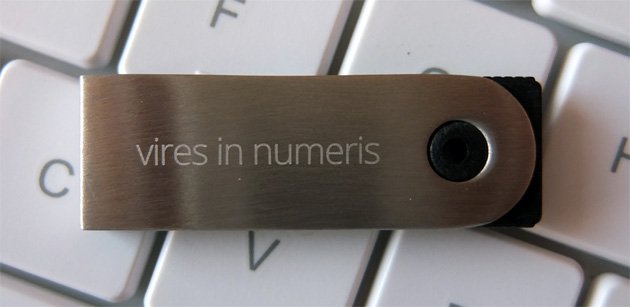
The compact Ledger USB Bitcoin Wallet uses smartcard security and is available for a reasonable price. CoinDesk reviewed this wallet in December 2014.
Paper wallets
One of the most popular and cheapest options for keeping your bitcoins safe is something called a paper wallet. There are several sites offering paper bitcoin wallet services. They will generate a bitcoin address for you and create an image containing two QR codes: one is the public address that you can use to receive bitcoins; the other is the private key, which you can use to spend bitcoins stored at that address.
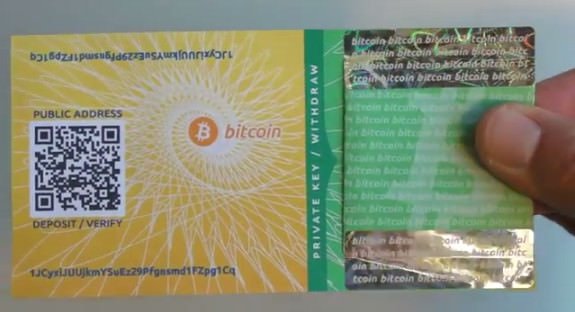
The benefit of a paper wallet that is made correctly is that the private keys are not stored digitally anywhere, and are therefore not subject to standard cyber-attacks or hardware failures.
Are bitcoin wallets safe?
It depends how you manage them. The private keys stored in your wallet are the only way to access the transaction data stored in a bitcoin address. If you lose them, you lose your bitcoins. So, they are only safe in so far as no one else can access them, and they don’t get lost.
Are bitcoin wallets anonymous?
On the one hand, bitcoin is entirely anonymous. On the other, it is completely transparent and trackable. Due to this fact, bitcoin is often cited as being pseudonymous.
This fact resulted in some companies emerging with the goal of controversially tracking suspect transactions to 'police' the blockchain. To counter this, ideas were developed in the bitcoin community to take anonymity further, such as merge avoidance, stealth addresses, and coin mixing.
The alpha version of Dark Wallet – a crowdfunded bitcoin wallet – went live in May 2014. Created by Amir Taaki and Cody Wilson, Dark Wallet was designed to provide new tools for financial privacy, including in-built coin mixing and stealth wallet addresses. At the time of writing, the developers are urging users to use the testnet with 'play money' to iron out bugs before risking significant amounts of bitcoin.
Wallets and services like Dark Wallet ultimately mean that using bitcoin can be as anonymous as you want it to be.
How can I secure my wallet?
There are several ways to make your bitcoin wallet more secure:
Encrypt it
One way to protect your wallet from prying eyes is to encrypt it with a strong password. This makes it difficult to access your wallet, but not impossible. If your computer is compromised by malware, thieves could log your keystrokes to find your password.
Back it up
If you have your private keys stored in one wallet, but you mislay that wallet or it gets corrupted, you will lose your keys. Backing up your wallet makes a copy of your private keys, but it's important to back up your whole wallet. Some addresses are used to store change from transactions, and may not be shown to you by default. Back up the whole wallet in several different places, and keep them safe from prying eyes.
Use multisig
The number of services which support multi-signature transactions is increasing. Multi-signature addresses allow multiple parties to partially seed an address with a public key. When someone wants to spend some of the bitcoins, they need some of these people to sign their transaction in addition to themselves. The required number of signatures is agreed at the start when people create the address.
Since multiple signatures are needed before funds can be spent, the additional signatures could come from, say, a business partner, your significant other, or even from a second device which you own, to add a second factor to spending your coins.
Take it offline
Safe with cash insideIf you are too nervous to store your bitcoin keys digitally, for fear that they may be stolen by hackers, there is another option: ‘cold storage’. Cold storage wallets store private bitcoin keys offline, so that they can’t be stolen by someone else on the Internet.
It’s a good idea to use cold storage for the bulk of your bitcoin fortune, and transfer just a little to separate bitcoin addresses in a ‘hot’ wallet with an Internet connection, making it easy to spend. That way, even if your mobile phone is lost, or the hot wallet on your notebook PC is erased during a hard drive crash, only a small amount of bitcoin cash is at risk.
Many software bitcoin wallets feature a cold storage option. Or, you could go completely analogue, and simply use paper wallets for offline storage.
HOW TO SELL BITCOIN
Selling bitcoin isn't quite as straightforward as buying bitcoin, but fortunately CoinDesk is here to help. This guide will give you all the information you need to cash out your digital currency.
When deciding how to sell your bitcoin, you first need to consider which method best suits your situation: selling bitcoin online or selling bitcoin in person. Each option has its own advantages and disadvantages.
Selling bitcoin online
Selling bitcoin online is by far the more common way of trading your bitcoin. There are now three ways to go about selling bitcoin online.
- The first way involves a direct trade with another person, an intermediary facilitating the connection.
- The second way is through an online exchange, where your trade is with the exchange rather than another individual.
- New peer-to-peer trading marketplaces that allow bitcoin owners to obtain discounted goods with their bitcoin via others that want to obtain the cryptocurrency with credit/debit cards. The two groups are brought together to solve both problems in a kind of peer-to-peer exchange.
1. Direct trades: Websites that offer this type of selling structure include Coinbase and LocalBitcoins in the US, and BitBargain UK and Bittylicious in the UK.
!shutterstock_123850171-630x420.jpg
On these sites, you will usually have to register as a seller. This involves verifying your identity, which we will discuss again later. Once you have registered, you can post an offer, signalling that you want to sell, and the website will alert you when a buyer wants to trade with you. From there, your interaction is solely with the buyer, but you use the website to complete your trade.
The process of selling on Bitbargain UK and (more so) Bittylicious can be quite involved and requires some patience. However, support at the former site has been great in our experience. Bitcoin users with bank accounts in the United States should consider using Coinbase or Circle, which have both won many fans with their simplicity.
Bitcoin can be traded with other currencies
2. Exchange trades: The other way to sell bitcoins is to register with an online exchange. You will still have to verify your identity, but in this case you won’t have to do as much work when it comes to organizing the sale.
Exchanges act as an intermediary who holds everyone's funds. You place a ‘sell order’ (just as you would place a buy order), stating the volume (amount) and type of currency you wish to sell (eg bitcoin), and the price per unit you wish to sell for.
As soon as someone places a matching buy order, the exchange will complete the transaction. The currency will then be credited to your account.
The downside that accompanies this ease of use is that, if you are selling bitcoin for fiat currencies, you will need to withdraw those funds to your bank. If the exchange is facing liquidity problems or issues with its banks, it can take an inordinate amount of time to receive your funds.
Mt. Gox became infamous for this problem before it went bankrupt, and BTC-e has recently been plagued with reports of similar difficulties. Therefore, you should carefully research the exchange you intend to use before committing funds.
Examples of other crypto-to-fiat currency exchanges include Circle, Kraken and Bitstamp.
Alternatively, you could use a pure cryptocurrency exchange to change bitcoin for another cryptocurrency. It's less likely that anyone would want to do this, but there are reasons such as arbitrage, or the rare occasion if a shop accepts something other than bitcoin (for example, Bitcoin Shop now accepts litecoin and dogeoin too, for a wide range of goods).
Examples of these types of sites are: BTER, CoinCorner and Cryptsy.
In addition, you’ll have to pay a fee to use some exchanges. BTC-e charges a flat 0.2%. For overviews of what fees are charged by the various cyrptocurrency markets and what volumes are being traded, see CoinCompare and Bitcoin Charts for up-to-date information.
3. Peer-to-peer trading marketplaces
A new development in the bitcoin space is the advent of sites like Brawker and Purse, which set out to bring together two groups of people with specific and complementary needs.
The first group are individuals who want to be able to use bitcoin to buy goods from sites which do not yet directly accept digital currencies. The second comprises of others who would like to buy bitcoin with a credit or debit card. The marketplace brings together individuals with matching requirements to effectively sell bitcoin to one and provide discounted goods for the other.
The marketplace acts as an intermediary, offering users the platform, bitcoin wallet and escrow for transactions.
Concerns with withdrawing funds
The universal way to move money around the world is international wire transfers. Most (if not all) online bitcoin markets support this method of transferral.
Withdrawing Funds from Bitcoin Exchanges

Another way to transfer money to your bank after selling bitcoin is via the "Single European Payments Area" (SEPA) system. SEPA was designed to make international transfers between member states of the European Union more efficient. Some exchanges (such as Kraken and BTC-e) support these payments.
However, transfers take a very long time (around four days), and can incur large charges – potentially making trading prohibitively expensive. HSBC, for example, charges £4 per SEPA payment made via online banking and £9 per WorldPay transaction. Barclays charges £15 per SEPA payment and £25 for other international transactions.
If you are opening an account with the specific purpose of receiving funds from bitcoin trading, you may find high street banks refuse to do business with you. HSBC has explicitly refused the author of this guide accounts for bitcoin trading.
You can also use third-party payment processors to withdraw and receive fiat funds. The numbers of these services is dwindling, however. OKPAY recently stopped engaging with bitcoin businesses.
2. Selling bitcoin in person

How to Sell Bitcoin in Person
Selling bitcoin in person can, in many ways, be the easiest way to pass on your digital currency. Simply scanning a QR code on another person's phone and accepting cash-in-hand is about as easy as a bitcoin transaction can get.
If you have friends or family who want to buy bitcoin, the process is simple. Set them up with a bitcoin wallet, send them the bitcoins and collect your cash.
There are several things to be aware of when selling bitcoin in person.
Agree on a price: Decide on a rate works for you.
Many use a price from a prominent bitcoin exchange, or the CoinDesk Bitcoin Price Index.
Some sellers apply a percentage on top of these rates to cover costs and as a convenience/anonymity premium.
You could use a mobile app to calculate prices. Popular apps include Zeroblock and BTCreport.
It helps to be aware of local fluctuations in price. Price can vary from country to country, often due to difficulties in obtaining bitcoin with the local national currency.
There are many bitcoin meetups around the world where people are happy to trade bitcoin and other cryptocurrencies.
Stay safe
HOW DO BITCOIN TRANSACTIONS WORK
Bitcoin transactions are sent from and to electronic bitcoin wallets, and are digitally signed for security. Everyone on the network knows about a transaction, and the history of a transaction can be traced back to the point where the bitcoins were produced.
Holding onto bitcoins is great if you’re a speculator waiting for the price to go up, but the whole point of this currency is to spend it, right? So, when spending bitcoins, how do transactions work?
There are no bitcoins, only records of bitcoin transactions
Here’s the funny thing about bitcoins: they don’t exist anywhere, even on a hard drive. We talk about someone having bitcoins, but when you look at a particular bitcoin address, there are no digital bitcoins held in it, in the same way that you might hold pounds or dollars in a bank account. You cannot point to a physical object, or even a digital file, and say “this is a bitcoin”.
Instead, there are only records of transactions between different addresses, with balances that increase and decrease. Every transaction that ever took place is stored in a vast public ledger called the block chain. If you want to work out the balance of any bitcoin address, the information isn’t held at that address; you must reconstruct it by looking at the blockchain.
What does a transaction look like?
If Alice sends some bitcoins to Bob, that transaction will have three pieces of information:
An input. This is a record of which bitcoin address was used to send the bitcoins to Alice in the first place (she received them from her friend, Eve).
An amount. This is the amount of bitcoins that Alice is sending to Bob.
An output. This is Bob's bitcoin address.
How is it sent?
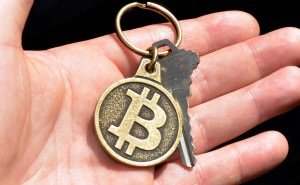
How do bitcoin transactions workTo send bitcoins, you need two things: a bitcoin address and a private key. A bitcoin address is generated randomly, and is simply a sequence of letters and numbers. The private key is another sequence of letters and numbers, but unlike your bitcoin address, this is kept secret.
Think of your bitcoin address as a safe deposit box with a glass front. Everyone knows what is in it, but only the private key can unlock it to take things out or put things in.
When Alice wants to send bitcoins to Bob, she uses her private key to sign a message with the input (the source transaction(s) of the coins), amount, and output (Bob’s address).
She then sends them from her bitcoin wallet out to the wider bitcoin network. From there, bitcoin miners verify the transaction, putting it into a transaction block and eventually solving it.
Why must I sometimes wait for my transaction to clear?
Because your transaction must be verified by miners, you are sometimes forced to wait until they have finished mining. The bitcoin protocol is set so that each block takes roughly 10 minutes to mine.
Some merchants may make you wait until this block has been confirmed, meaning that you may have to make a cup of coffee and come back again in a short while before you can download the digital goods or take advantage of the paid service.
On the other hand, some merchants won’t make you wait until the transaction has been confirmed. They effectively take a chance on you, assuming that you won’t try and spend the same bitcoins somewhere else before the transaction confirms. This often happens for low value transactions, where the risk of fraud isn’t as great.
Are there any transaction fees?
Sometimes, but not all the time.
Transaction fees are calculated using various factors. Some wallets let you set transaction fees manually. Any portion of a transaction that isn’t picked up by the recipient or returned as change is considered a fee. This then goes to the miner lucky enough to solve the transaction block as an extra reward.
Right now, many miners process transactions for no fees. As the block reward for bitcoins decreases, this will be less likely.
One of the frustrating things about transaction fees in the past was that the calculation of those fees was complex and arcane. It has been the result of several updates to the protocol, and has developed organically.
Updates to the core software handling bitcoin transactions will see it change the way that it handles transaction fees, instead estimating the lowest fee that will be accepted.
What if I only want to send part of a bitcoin?
Bitcoin transactions are divisible. A satoshi is one hundred millionth of a bitcoin, and it is possible to send a transaction as small as 5430 satoshis on the bitcoin network.
IF YOU HAVE READ THIS FAR, THAT MEANS YOU HAVE ENOUGH KNOWLEDGE OF WHAT BITCOIN IS ... LOL...
Thank you for reading guys..
Source for all the information is from coindesk.com
Cheers :)
I don't know how long it will take, but I personally believe that bitcoin (and certain other altcoins) will eventually replace banks/banking for services and use needed by 80% of us who are tired of fees and corruption. Bitcoin is a big deal, because it established money that is:
• decentralized
• Decentralized
• DECENTRALIZED
(hope I made my point!)